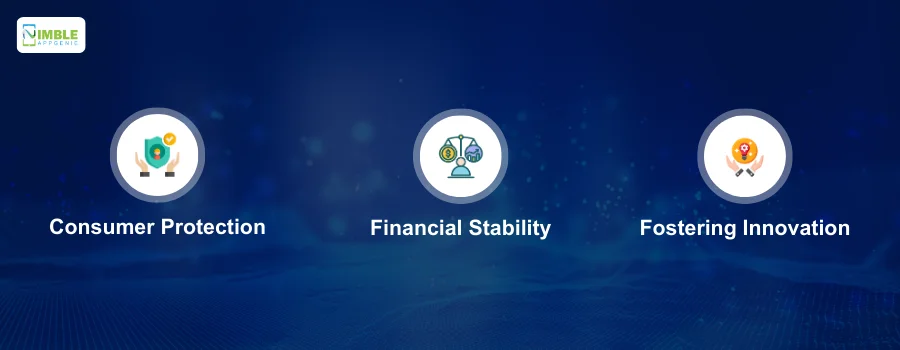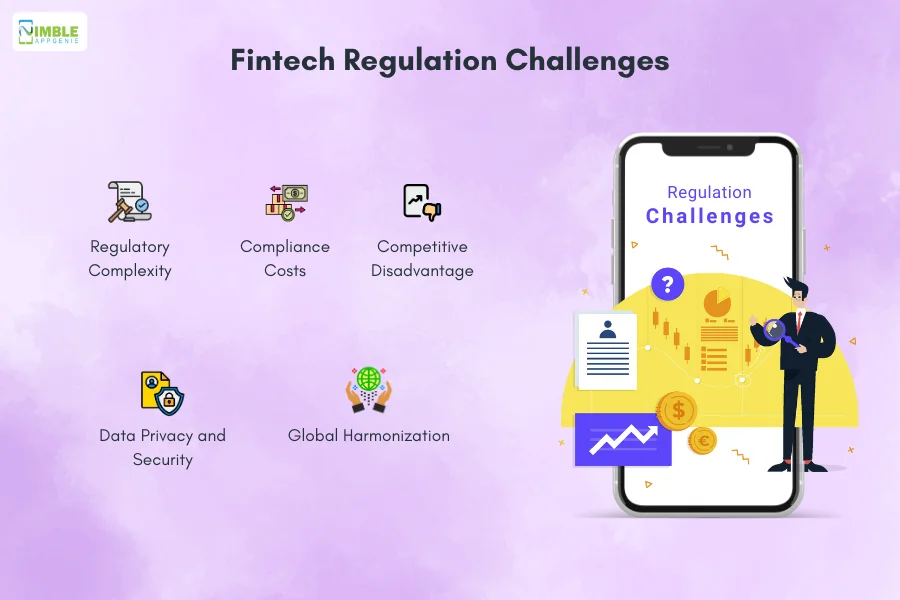Fintech is one of the largest and most lucrative markets in the world today. But it is also one of the most regulated ones.
In fact, when someone wants to build a fintech app, the first thing they need to worry about are plethora of fintech laws and regulations.
If you are one of them, this blog is for you.
In this guide to fintech regulations, we shall be discussing all you need to know about it, answering questions like, what it is, why it’s important, regulatory authorities, and so on.
Therefore, let’s get right into it:
What Are Fintech Regulations?
Let’s answer the important question first, “what is fintech regulation?”
Fintech regulations are a set of rules and guidelines governing the activities of companies that leverage technology to provide financial services.
These regulations aim to achieve several key objectives:
- Consumer Protection: Ensure the safety and transparency of financial products and services offered by fintech companies. This includes safeguarding consumers from fraud, scams, and unfair business practices.
- Financial Stability: Mitigate systemic risks and maintain the stability of the financial system. This involves preventing money laundering, terrorist financing, and other financial crimes.
- Innovation: Encourage responsible innovation within the fintech industry while addressing emerging risks. This helps foster a competitive landscape that benefits both consumers and businesses.
Key Areas Covered by Fintech Regulations
So, what are the areas covered by fintech compliances? Let’s look at the same below.
- Data Privacy and Security: How fintech companies collect, store, and use customer data.
- Anti-Money Laundering (AML) and Know Your Customer (KYC): Measures to prevent financial crime and identify customers.
- Consumer Lending and Credit: Regulations on loan terms, interest rates, and debt collection practices.
- Payment Systems: Rules governing the operation of electronic payments and money transfers.
- Investment Services: Regulations for platforms offering investment advice, crowdfunding, or trading securities.
Which Fintech Regulations Apply To Whom?
It goes without saying, there are a range of different fintech regulations. So, how do you know which of these regulations apply to you? Well, here’s how you figure that out.
Regulations that apply to your fintech company depend on the following factors:
1. Type of services
As we all know, fintech apps come in all shapes and sizes.
In simpler words, fintech is a parent category and branches off into different types. Each of them offers a unique service like Lending, payments, investments, etc.
Depending on the type of service, the compliance in fintech also highly differs.
2. Geographic Location
Another top factor on which fintech and compliance highly depend is the location.
While USA has its own set of regulatory compliance in fintech, and Europe has its own. In simple words, different countries have different regulatory frameworks.
3. Its Business Model and Target Audience
Lastly, to check which regulation and compliance apply to the said company, one has to check the fintech business model being used.
Depending on their model, regulations applied to them also change.
Who Should Worry About Fintech Regulations?
So, who should worry about fintech regulatory compliance? Well, there are a few parties. Let’s look at them:
- People Who Want To Develop A Fintech App
- A Mobile App Development Company
- Established Fintech Businesses Who Wants Enter Market
These are the parties who need to worry about fintech regulation and compliance. With the overview of fintech regulation done, let’s see, why it’s important.
Why Are Fintech Regulations Important?
Why are fintech laws and regulations so important?
While fintech regulations might seem like unnecessary hurdles in the path of innovation, they play a crucial role in establishing a healthy and sustainable financial ecosystem.

Here’s why:
1. Consumer Protection
Fintech regulations are super important for app security.
You see, fintech compliance deals with fraud and abuse. Without regulations, bad actors could easily exploit digital tools for scams, money laundering, and other illegal activities.
Regulations help create safeguards, requiring KYC/AML measures and data security practices to protect consumers.
In addition to that, regulations also promote transparency and fairness. Complex financial products and services can be confusing for users.
Regulations ensure clear disclosure of terms, risks, and fees, empowering consumers to make informed decisions and avoid unfair practices.
2. Financial Stability
Stability is one of the most important things any business can ask for.
Well, that’s exactly what we can achieve with the help of fintech rules and regulations. So, how does it do it?
There are actually two ones, by Minimizing Systemic Risk and also preventing financial crimes.
You see, the unregulated growth in certain areas of fintech could create bubbles with the potential to destabilize the broader financial system. Regulations set prudential standards for capital adequacy, risk management, and liquidity to prevent such crises.
In addition to this, global fintech regulations act as a barrier to such activities, ensuring the smooth flow of legitimate funds and fostering trust in the system.
3. Fostering Innovation
Whether we talk about fintech trends or core innovation, regulations plays an important part in it.
Clear regulatory compliance in fintech creates a predictable environment for all players, not just established institutions.
This allows smaller fintech companies to compete fairly and encourages responsible innovation within the industry.
Moreover, consumers are less likely to adopt new technologies if they perceive them as risky.
Fintech regulations address their concerns about data privacy, security, and fair treatment, ultimately fostering trust and driving wider adoption of innovative fintech solutions.
With the important of fintech law and regulation out of the way, it’s time to ask the big question “who regulates fintech companies?”.
Who Regulates Fintech Companies?
Are you wondering who the regulatory authorities that regulate fintech companies are? Well, this highly depends on the region as well as scope of regulations.
Let’s look at a detailed breakdown of the same below:
| Region | Country | Regulatory Body/Authority | Scope of Regulation |
| Global | International Organization for Standardization (ISO) | Data privacy | |
| International Telecommunication Union (ITU) | Data privacy | ||
| Financial Action Task Force (FATF) | Anti-Money Laundering (AML) | ||
| North America | United States | Securities & Exchange Commission (SEC) | Investments, crowdfunding, digital assets |
| Commodity Futures Trading Commission (CFTC) | Derivatives, futures | ||
| Consumer Financial Protection Bureau (CFPB) | Consumer protection | ||
| Office of the Comptroller of the Currency (OCC) | National banks, federal savings associations | ||
| Statelevel regulators | Specific activities like money transmission | ||
| Canada | Canadian Securities Administrators (CSA) | Investments, securities | |
| Financial Consumer Agency of Canada (FCAC) | Consumer protection | ||
| Office of the Superintendent of Financial Institutions (OSFI) | Banks, financial institutions | ||
| South America | Brazil | Central Bank of Brazil (BCB) | Financial institutions, payment systems |
| Brazilian Securities and Exchange Commission (CVM) | Investments, securities | ||
| Colombia | Superintendencia Financiera de Colombia (SFC) | Financial institutions | |
| Banco de la República (Central Bank) | Monetary policy, payment systems | ||
| Europe | European Union | European Banking Authority (EBA) | Banking, payments |
| European Securities and Markets Authority (ESMA) | Investments, securities | ||
| National regulators within each member state (e.g., FCA UK) | Various financial activities | ||
| NonEU countries | Similar independent or centralized regulatory structures | Varies by country, e.g., FCA in UK | |
| Asia | China | People’s Bank of China (PBOC) | Financial institutions, payment systems |
| China Securities Regulatory Commission (CSRC) | Investments, securities | ||
| India | Reserve Bank of India (RBI) | Banks, payment systems | |
| Securities and Exchange Board of India (SEBI) | Investments, securities | ||
| Japan | Financial Services Agency (FSA) | Financial institutions, activities | |
| Various structures by country | Varies, often central banks, finance ministries | ||
| Africa | South Africa | South African Reserve Bank (SARB) | Monetary policy, financial stability |
| Financial Sector Conduct Authority (FSCA) | Financial institutions, activities | ||
| Kenya | Central Bank of Kenya (CBK) | Monetary policy, financial stability | |
| Capital Markets Authority (CMA) | Investments, securities | ||
| Nigeria | Central Bank of Nigeria (CBN) | Monetary policy, financial stability | |
| Securities and Exchange Commission (SEC) | Investments, securities | ||
| Other countries | Similar structures emerging | Varies, often central banks, finance ministries | |
| Middle East | United Arab Emirates | Central Bank of the United Arab Emirates (CBUAE) | Monetary policy, financial stability |
| Securities and Commodities Authority (SCA) | Investments, securities | ||
| Financial Services Regulatory Authority (FSRA) | Specific financial activities | ||
| Saudi Arabia | Saudi Arabian Monetary Authority (SAMA) | Monetary policy, financial stability | |
| Capital Market Authority (CMA) | Investments, securities |
Fintech Regulations Around The World
Now that we know who authorities behind fintech regulatory compliance, it’s time to look at the global fintech regulation.
In this section of the blog, we shall be going through some of the top fintech compliance checklist for top locations.
Let’s get right into it:
A] USA – Fintech Regulations in USA
Let’s start with Fintech regulation in United States of America.
Similar to the EU, navigating fintech regulations in the US involves understanding a complex patchwork of laws across different levels and agencies.
Here’s a closer look at specific regulations in key areas:
Consumer Protection
- Gramm-Leach-Bliley Act (GLBA): Safeguards financial privacy and requires data security measures for customer information.
- Fair Credit Reporting Act (FCRA): Governs the collection, dissemination, and use of consumer credit information, impacting credit scoring, reporting, and lending practices.
- Fair Debt Collection Practices Act (FDCPA): Regulates debt collection activities, limiting harassment and unfair practices.
Money Transmission
- Money Transmitter Licenses: Most states require a license to transfer money, with varying requirements depending on the specific activity and volume.
- Bank Secrecy Act (BSA) / Anti-Money Laundering (AML): Mandates Know Your Customer (KYC) procedures, transaction monitoring, and suspicious activity reporting to combat money laundering and terrorist financing.
Securities Regulation
- Securities Act of 1933: Requires registration and disclosure for offerings of securities, applicable to fintechs selling investment products or crowdfunding platforms.
- Securities Exchange Act of 1934: Regulates trading activities and broker-dealers, impacting fintechs offering investment advice or trading platforms.
Emerging Areas
- Consumer Financial Protection Bureau (CFPB): Issues regulations and enforces consumer protection laws impacting various fintech activities, including data privacy, fair lending, and unfair practices.
- Office of the Comptroller of the Currency (OCC): Proposes a “fintech charter” for specific types of fintech companies, aiming to create a dedicated regulatory framework.
B] Fintech Regulations in Europe – EU (European Union)
With the USA fintech regulations out of the way, let’s look at the fintech regulation for European Union. Let’s start with some of the generate ones, then we shall go with ones from each section.
Consumer Protection
- General Data Protection Regulation (GDPR): Requires strong data security and privacy measures, impacting data collection and usage practices across all fintech activities.
- Payment Account Directive (PAD): Ensures transparency and consumer protection for payment accounts, including basic bank accounts and e-wallets.
- Mortgage Credit Directive (MCD): Sets standards for fair mortgage lending practices, impacting fintechs offering mortgage-related services.
Payment Services
- Payment Services Directive 2 (PSD2): Enables open banking by mandating banks to open up access to customer data with their consent, facilitating innovative payment solutions.
- Electronic Money Directive (EMD): Regulates the issuance and distribution of electronic money, relevant for fintechs offering e-money products or services.
Investment Services
- Markets in Financial Instruments Directive II (MiFID II): Regulates investment firms and activities, impacting fintechs offering investment advice, portfolio management, or securities trading.
- Prospectus Regulation: Sets requirements for prospectuses used to offer securities to the public, impacting crowdfunding platforms or investment token offerings.
Anti-Money Laundering (AML)
- AML Directive 5: Requires customer due diligence, transaction monitoring, and reporting suspicious activity for money laundering and terrorist financing prevention, applicable to all financial institutions including fintechs.
- Upcoming AML Package 6: Expands AML/CFT regulations, potentially introducing stricter requirements for crypto-assets and virtual asset service providers.
Emerging Areas
- Markets in Crypto-Assets Regulation (MiCA): Coming into effect in 2024, it will regulate crypto-asset issuance, trading platforms, and custodial services, providing clarity and harmonization for crypto-focused fintechs.
- Digital Operational Resilience Act (DORA): Sets standards for digital resilience and incident response for financial institutions, impacting fintechs’ reliance on technology and its security practices.
Now that we are done with the fintech regulation checklist for two of the most important fintech markets, it’s time to look at the specific regulations for fintech niches.
Fintech Regulations For Different Sectors
It goes without saying there are n number of fintech ideas which branches of into different niches or sectors.
Each of them have a different regulation and compliance in fintech. Let’s look at them with few examples.
| Sector | Prominent Regulations | Examples |
| eWallet App Development | PSD2 (Europe), Payment Services Directive (PSD) (various countries), AML/KYC requirements | Mobile wallet apps, P2P payments, online money transfer |
| Loan Lending App Development | Consumer Financial Protection Bureau (CFPB) regulations (US), Fair Lending Act (US), Dodd-Frank Act (US) | Peer-to-peer lending apps, online loan platforms, alternative lending solutions |
| Investment Platform Development | Securities and Exchange Commission (SEC) regulations (US), MiFID II (Europe), crowdfunding regulations | Robo-advisors, online investment platforms, alternative investment platforms |
| InsurTech App Development | InsurTech regulations (varying by country), AML/KYC requirements | InsurTech platforms offering parametric insurance, peer-to-peer insurance models |
| Wealth Management | Financial Industry Regulatory Authority (FINRA) regulations (US), Investment Advisers Act (US), GDPR (Europe) | Online wealth management platforms, digital asset advisors |
| Crowdfunding Platform Development | Jumpstart Our Business Startups Act (JOBS Act) (US), crowdfunding regulations (varying by country) | Equity crowdfunding platforms, debt crowdfunding platforms, reward-based crowdfunding platforms |
Fintech Regulation Challenges
It goes without saying, there is no industry without challenges or issues.
While fintech regulations aim to protect consumers and ensure financial stability, they also present several challenges for companies operating in this dynamic space.

Here are some key fintech regulation issues:
1. Regulatory Complexity
Let’s start with one of the largest fintech regulation challenges, complexity.
Firstly, there are multiple regulators. And that’s why navigating a maze of regulatory bodies and their often-differing rules across jurisdictions can be overwhelming.
In addition to this, the fintech regulations and compliances are constantly changing. Therefore, keeping up with constant regulatory changes and adaptations due to technological advancements adds further complexity.
2. Compliance Costs
In addition to fintech solution development cost, fintech compliances comes at addition implementation cost.
Why? Because adapting technology, processes, and internal controls to comply with regulations can be expensive and time-consuming.
Plus, reporting and record keeping can be a challenge of its own. Not to mention, legal and compliance expertise involved. Hiring and retaining professionals with specialized knowledge of fintech regulations can be costly.
3. Competitive Disadvantage
While everyone wants to create a mobile app to make it successful, one of the fintech compliance challenges poses an opposite threat.
You see, the regulatory Burden, Large – established financial institutions may have more resources to handle compliance, creating an uneven playing field.
In addition to this, companies have limited access for new entrants as complex regulations can create barriers to entry for new startups, hindering competition and innovation.
4. Data Privacy and Security
Ensuring data privacy and security comes with inherent challenges, often creating a delicate balancing act with user experience and convenience.
Implementing strong security measures might involve additional steps for users, potentially impacting their flow and satisfaction.
Likewise, cross-border data regulations, while important for protecting information, can introduce complexities for international organizations operating in multiple jurisdictions.
Furthermore, managing consumer expectations adds another layer of complexity.
Consumers increasingly demand transparency around data collection practices while also expecting personalized experiences driven by that data.
5. Global Harmonization
The fragmented nature of data regulations poses a significant fintech regulation challenge for global businesses.
Inconsistent frameworks across different countries create barriers to cross-border expansion and market growth.
Achieving global harmonization, however, is no easy feat.
Finding consensus on regulations suitable for evolving technologies and business models requires complex negotiations and coordination between nations.
Emerging Trends in Fintech Regulation
With all said and done, it’s time to look at fintech regulation and compliance trends.
The dynamic nature of fintech necessitates constant adaptation in the regulatory sphere. Here are some key trends shaping the future of fintech regulation.

Let’s get right into it:
1. Prioritizing Consumer Well-being
FinTech regulations increasingly revolve around safeguarding consumers.
Data privacy takes center stage, with regulations like GDPR and CCPA empowering users with data protection rights, transparency, and control.
Algorithmic fairness comes under scrutiny, demanding responsible AI use in FinTech, ensuring algorithmic decisions are unbiased and explainable.
Furthermore, financial inclusion becomes a key focus, promoting regulations that leverage FinTech innovations to expand access to financial services for underserved populations.
2. Striking a Balance
Global fintech regulatory sandboxes emerge as collaborative platforms where innovative FinTech solutions are tested in controlled environments, fostering responsible experimentation before wider adoption.
In addition to this, the regulations move towards proportionality and risk-based approaches, tailoring rules to the specific risks posed by different FinTech activities, avoiding a “one-size-fits-all” approach.
Technology-facilitated supervision empowers regulators with RegTech tools for data analysis and risk monitoring, enabling more efficient and targeted oversight.
3. Sharing Data Responsibly
Open banking APIs unlocks new possibilities by expanding access to customer data with consent, fostering competition and innovation in financial services.
Data portability empowers consumers to easily transfer their data between providers, increasing choice and control.
However, robust data security and privacy safeguards remain crucial to ensure ethical data use and maintain trust in the ecosystem.
4. Navigating Uncertainty
Emerging technologies like Decentralized Finance (DeFi) pose challenges for regulators who strive to catch up with the rapid pace of innovation while addressing potential risks and opportunities.
Similarly, Artificial Intelligence (AI) in FinTech demands careful scrutiny, focusing on explainability, fairness, and potential harms.
Cryptocurrency and digital assets remain subject to ongoing debate regarding appropriate regulations, balancing innovation with consumer protection and financial stability.
5. Collective Action
SupTech initiatives showcase regulators collaborating with technology companies to develop innovative supervisory tools and approaches.
International regulatory collaboration takes center stage, with efforts to harmonize regulations across jurisdictions for smoother cross-border trade and innovation.
Finally, multi-stakeholder engagement incorporates diverse perspectives by including industry players, consumer groups, and academics in regulatory discussions, ensuring well-rounded and effective regulations.
How Nimble AppGenie Can Help
Struggling to bring your fintech vision to life? Nimble AppGenie, a leading fintech software development company, can help.
And we have hands on experience of working on top experience:
- Pay By Check– Ewallet Mobile App
- DafriBank– Digital Bank Of Africa
- SatPay– Ewallet Platform
- CUT– E-Wallet Mobile App
- SatBorsa– A Currency Exchange Fintech App
Hire mobile app developers with deep fintech knowledge and a passion for innovation. They’ll craft a secure, user-friendly app that perfectly aligns with your goals. Leverage their proven track record and future-proof technology to stand out in the competitive market.
They go beyond development, offering guidance from ideation to launch and beyond.
Ready to unlock the potential of your fintech dream? Get a free consultation today and see how Nimble AppGenie can turn your vision into reality.
Conclusion
Navigating the intricate landscape of fintech regulations is essential for anyone involved in the industry, from app developers to established businesses. While compliance may present challenges, such as regulatory complexity and compliance costs, it ultimately fosters consumer protection, financial stability, and innovation. As the regulatory environment continues to evolve, staying informed about emerging trends and leveraging expert assistance, can streamline compliance efforts and ensure sustainable growth in the dynamic world of fintech.
FAQs
Fintech regulations are rules and guidelines established by regulatory bodies to govern the activities of companies leveraging technology to provide financial services. These regulations aim to ensure consumer protection, maintain financial stability, and foster innovation within the fintech industry.
Fintech regulations play a crucial role in establishing a healthy and sustainable financial ecosystem by protecting consumers from fraud and abuse, maintaining the stability of the financial system, and fostering responsible innovation.
Fintech companies are regulated by various regulatory bodies and authorities depending on their geographic location and the type of services they offer. These regulators include international organizations like the ISO and ITU, as well as national regulators such as the SEC in the United States and the FCA in the UK.
Fintech regulations cover areas such as data privacy and security, anti-money laundering (AML) and know your customer (KYC) measures, consumer lending and credit, payment systems, and investment services.
Fintech regulations vary across regions due to differences in regulatory frameworks, legal requirements, and cultural considerations. For example, regulations in the European Union may differ from those in North America or Asia.
In the USA, specific fintech regulations include the Gramm-Leach-Bliley Act (GLBA) for consumer privacy, the Fair Debt Collection Practices Act (FDCPA) for debt collection, and SEC regulations for securities. In the EU, regulations such as the General Data Protection Regulation (GDPR) and the Payment Services Directive 2 (PSD2) are prominent.
Fintech companies face challenges such as regulatory complexity, compliance costs, competitive disadvantages compared to traditional financial institutions, data privacy and security concerns, and the need for global harmonization of regulations.
Emerging trends in fintech regulation include a focus on consumer protection, regulatory convergence and flexibility, open banking and data sharing initiatives, addressing regulatory uncertainty related to emerging technologies like decentralized finance (DeFi) and artificial intelligence (AI), and increased regulatory collaboration and international coordination.
Regulatory problems in fintech include fragmentation across jurisdictions, lack of clarity and guidance, high compliance costs, slow approval processes, mismatched regulations, data privacy concerns, regulatory arbitrage, and risks for emerging technologies.

Niketan Sharma is the CTO of Nimble AppGenie, a prominent website and mobile app development company in the USA that is delivering excellence with a commitment to boosting business growth & maximizing customer satisfaction. He is a highly motivated individual who helps SMEs and startups grow in this dynamic market with the latest technology and innovation.
Table of Contents














No Comments
Comments are closed.